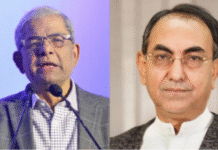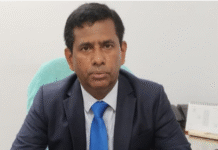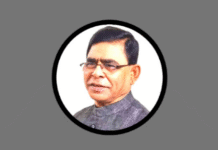

The upcoming election is currently, one of the most talked about topics for Bangladeshis. The issues regarding EVM that Awami League has raised has been happily embraced by the Election Commission.
Responding to an invitation from the Election Commission, Dr Mohammad Kaykobad, Dr Muhammed Zafar Iqbal and a few other experts went to see how the EVM works. According to them, there is no scope for vote fraud in the EVM mechanism. The Daily Star talked to technology expert and a former professor of BUET, Dr Mohammad Kaykobad to find out why they came to this conclusion.
The Daily Star: You have mentioned that there’s no scope for vote tampering in EVM. What is this view based on?
Professor Dr Kaykobad: This EVM has been designed and manufactured in Bangladesh, under the Machine Tools Factory. As a teacher of technology, it is very natural that I will show interest and endorse any Bangladeshi technology. Any and every issue that can come up in our elections has been considered while designing this.
They have demonstrated every part of the machine. It doesn’t involve any complex programming. Each part has been customised. One part cannot be modified by another. Based on our technological knowledge, we understood that if what has been said is true, then it is a very high-quality machine.
However, it must be said that within that small time window, we ourselves did not test the machine. They showed us the machine and spoke about it, and we participated in the discussion as per our technological knowledge. Now the election commission or the political parties can check and see whether the claims are true or not. They should see if they can find any errors in the machine. This is called black box testing; which the stakeholders can conduct, and we can rely on the accuracy of the machine if the desired output is received against the given inputs. We can also conduct an end-to-end white box testing utilising specialists.
TDS: Where can such testing take place?
Dr Kaykobad: Bangladeshi citizens have faith in BUET. The technical aspects of all the big projects are tested here. Thus, this machine can also be tested there.
TDS: You went to the Election Commission, observed the EVM and mentioned that no opportunity exists for vote fraud. You do have an idea about how the last two national elections have been conducted. Don’t you think making such remarks would be controversial? Does a proper election depend on EVM, or does it depend on the election commissioners, who will actually run the polls?
Dr Kaykobad: I have no comments on what will happen in the election and whether ballots or EVM will be used in it. I just talked about the technical aspects of the EVM. I did not go to the election commission to vouch for them. I was called in as a technology expert. I only talked about the technology. I have said that this EVM cannot be manipulated to change results. I did not go to the election commission to enhance public trust or acceptance for them.
TDS: During the last election, some people belonging to a particular party were stationed inside the voting booths. They used the EVM to reveal the voter’s identity and then showed them which button to push. On certain occasions, they themselves pushed the button. If this is the experience in the ground what weight will comments like this that , the EVM cannot be manipulated or it can’t be used for vote fraud have?
Dr Kaykobad: I am neither accepting nor rejecting your experience. If this is the ground-level scenario, if there’s no belief or trust, then not only EVM—nothing can be used to hold a fair election. After opening the EVM using a voter’s fingerprint, if someone else presses the button to cast the vote, then the machine cannot be blamed. This is an issue with election management. We did not talk about the management aspect. That is the election commission’s duty. We are talking specifically about the EVM.
TDS: So, the EVM will function according to the way it is operated by the person or group of persons in charge of it right?
Dr Kaykobad: Everything will be pre-programmed. The total number of voters in a particular centre and their information will be included in it; be it voter’s demographic or biometric information, everything will be in it. Even who the presiding officers are, that information will also be there. Now if voting starts at 8am, it will end at 4pm. All of these parameters will be programmed. Nothing can be changed in between.
As an example, we go to the ATM machines in banks and withdraw money. We believe whatever the computer tells us. We think that the computer is doing its job properly. Thus, we have confidence in it. We go to the banks hundreds of times. When we have an urgent need, they provide us money. Often, we display unfailing faith in foreign software, spare parts, etc. We can use our own technology, regardless of party or ideology, and identify any limitations and work together to rectify them and to enhance it.
TDS: But the problem is that in Bangladesh we have little faith in the place from where the machines are being customised and programmed. We have no idea about what has been programmed. In the last election, EVM was used in a few constituencies. We raised questions about those, too. Did you collect any information about them?
Dr Kaykobad: Unfortunately, I don’t know much about that. From what I’ve read from the newspapers, EVM has been used in many places. My understanding is, there were no systematic errors and few questions were raised. I can be wrong, though. EVM has been enhanced based on user experience. As an example, if someone is unable to give fingerprint, an alternative has been improvised. You can, however, question each and every new inclusion.
TDS: The big question is not the fact whether the election gets conducted through ballots or EVM. The main issue is, whether the election commission can be trusted or not.
Dr Kaykobad: One way to eliminate this suspicion is to demonstrate or use the machine repeatedly. We can cast votes many times to see if it can count the votes properly. Each machine cannot be programmed separately; that’s not feasible. The same programme should be running on every machine. However, the data for each centre is unique. I believe, you, as journalists can ask the election commission to allow you to test the machine, whether it malfunctions or not. You can also cast votes repeatedly to see if it works properly or not. If we test it many times, then, maybe we will have some confidence in them.
Translated by Mohammed Ishtiaque Khan









